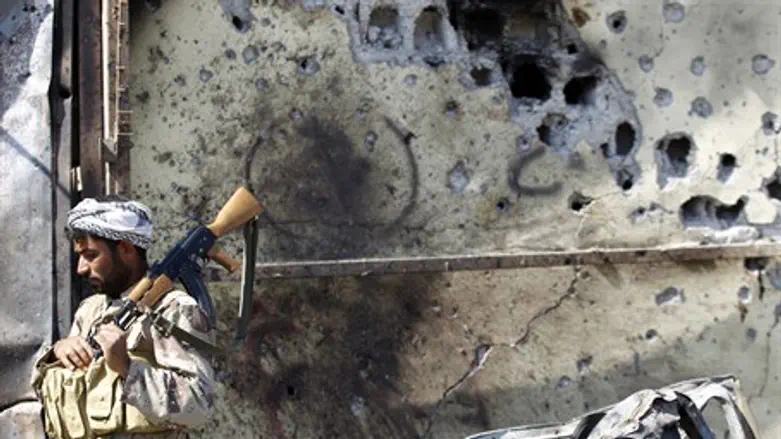
While Binyamin Netanyahu and Barack Obama spar on the approach to Iran, one expert considers the strong possibility that the US is trying to make ISIS into "Iran's Vietnam."
The Netanyahu speech to Congress last week has influenced a number of questions from journalists and statements from the White House. It seems that if Netanyahu has not had direct influence on the Iran negotiations, he has successfully manufactured public pressure on the Obama Administration.
However, his critique of the way the US is allowing Iran more influence in Iraq might be misplaced. There is the possibility that the United States is not just trying to keep its boots off the ground to avoid entanglement in the conflict, but also to force Iran to insert its own troops.
"Hopefully, the economic and human costs of fighting ISIS will bring Iran to scuttle its program," says Professor Hillel Frisch of the Begin Sadat Center for Security Studies in Tel Aviv. "As far as I can ascertain, this might be the US strategy, given the very limited air campaign against the Islamic state. The problem is Iran's nuclear program, not ISIS."
He still thinks though that in the midst of that approach, the US is not supporting Israel or Saudi Arabia as allies and merely enabling them to play the role of foil to other states in the region in place of the United States. This might explain some of the disconnect between Israel and Saudi Arabia on the one hand and the Obama Administration on the other.
Frisch wrote in a recent article:
"This policy of appeasement towards Iran is seemingly justified by a wider doctrine that the US has to retrench from overextending military engagements that characterized the previous decade by balancing ‘offshore’ between Iran, Turkey, Egypt, Saudi Arabia and Israel, the major regional players in the area, irrespective of the degree of friendship these actors display towards the US. The promoters of this doctrine argue that these actors will constrain each other to produce a modicum of stability at little to no expense to US blood or treasure."
When asked what Professor Frisch saw as the most illusory about that strategy, he said he does not think that "balancing between Iran, Israel, Egypt and Turkey is a good thing because only Iran can project force outside its borders through its various militias in Iraq, Lebanon and Yemen and more importantly, in advancing in its nuclear program."
“Iran is the only state with clear, long-term offensive capabilities.”
Only Iran is making progress on fronts across the Middle East. Israel, Saudi Arabia, Turkey and Egypt do not have their own militias and satellite countries.
Still, Professor Frisch thought it important to put Iran’s threat into perspective, relative to ISIS on the one hand and to the oft-compared Nazi Germany on the other.
“I know that we don’t enjoy thinking about it, but it is better they fight each other than us. ISIS is a certain kind of threat but it's nothing like the threat Iran poses.”
“I think it’s silly to compare it to Nazi Germany (militarily). Germany was the world’s third most powerful country on the eve of World War II. Iran doesn’t have the power Germany did before it invaded Poland.”
He did note that the other issue when comparing Iran to Nazi Germany is that the analogy might fall on deaf ears as so long as Iran only explicitly threatens Israel as opposed to Western countries. Nazi Germany’s threat was obviously immediate for the French, the British and the Americans. The argument would have to be less reliant on this analogy to reach more people. On the other hand, the threat ISIS poses to Western countries is very apparent in the wake of several terrorist attacks against media and Jewish targets.
"I think that the US should focus primarily on stopping the program and in more minor fashion in bolstering states like Jordan to contain ISIS rather than fighting it directly."
Professor Frisch sees it as critical that it is not lost on strategists to work against both ISIS and Iran, but he has no doubt that Iran is the stronger of the two antagonists. For that reason, he hopes that ISIS is only strong enough to keep the Iranians and their allies busy and overextended on the battle field. In fact, Frisch wonders if this might already be the approach of the US military.
“I hope Iran is increasingly sucked into the fight against it, which might turn Iraq into Iran's Vietnam.” On whether or not that could hurt Kurdistan or other allies by extension, Frisch added, “I think the US should protect all its allies and contain ISIS (emphasis his own).”
“I have a feeling that’s what they’re doing because airstrikes aren’t serious. They are there to blunt its offensive thrust and to weaken them, but not to decimate them. Based on the people I’ve spoken to, there are too few sorties (against ISIS) to make a difference.”
Andrew J. Tabler of the Washington Institute has suggested in the past that Syria might be “Iran’s Vietnam,” describing how Iran might face stiff Sunni opposition if its forces or allies had to fight ISIS in areas that are nearly 100% Sunni, but he hints this same sort of strategy in Syria could result in a stalemate where ISIS and the regime end up controlling two parts of a split Syria. Frisch sees Iraq as being more likely to serve that "Vietnam" role.
“Don't forget that Iraq is closer to Iran and they have a common border. Iraq looms much larger in strategic thinking than Syria does.”
